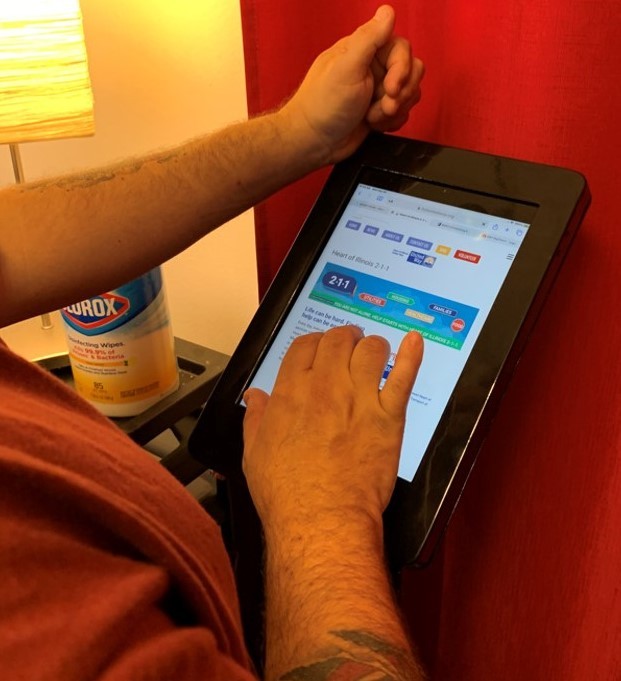Connecting Chicago area homeless to health care support
Piloting iPad kiosks for easier access

More than 58,000 people in Chicago experience homelessness, and with that, comes an increased likelihood of premature death because of a lack of connection to ongoing medical care.
A grant-funded project through the inaugural Community Health Advocacy (CHA) program, a partnership with OSF HealthCare and the University of Illinois Chicago (UIC), will offer a digital connection for those living in homeless shelters. Initially, the pilot will place kiosks with iPads at two south Chicago homeless shelters, as well as in a third shelter near OSF HealthCare Little Company of Mary Medical Center in Evergreen Park.
Scott Barrows, who directs the OSF Innovation Design Lab at the Jump Simulation & Education Center in Peoria, says the embedded iPads will provide a digital connection with a center at the UIC College of Pharmacy.
“This digital connection is hopefully going to address (medication) compliance for long-term health care issues like diabetes, high blood pressure, infection, as well as some behavioral health issues. That’s actually a huge issue that I think the telemedicine and the iPad kiosks will help address.”
Within the iPad is an app OSF HealthCare developed to screen for social determinants of health. The app already is being used in medical clinics and homeless shelters in Peoria, and provides a connection to community resources for food, transportation, permanent housing and financial counseling among other supports.
Barrows believes the lessons learned in Peoria will help as the project rolls out in the Chicago Metro area.
“The shelters are pretty overwhelmed, so the connections we’ll make will be with other partners in the city and the state, the federal government, private agencies, some insurance agencies, health care organizations … so it’s a partnership, and that is one of the things in our app – we’ll connect resources.”
Barrows says helping the homeless population manage chronic diseases is important.
“Foot care is very critical. A lot of our homeless population are diabetic and they have foot sores. As far as maternal care – mothers and women who might be pregnant; helping them care better for their health.”
In Peoria, the biggest issues among the homeless population include access to addiction services, wound care and mental health providers.
A secondary goal of the CHA grant project is to reduce reliance on more costly care options – urgent care centers or emergency departments.
“We think we can save expenses for health care conditions by better managing prescriptions and compliance, as well as trying to help people in the shelters take care of their conditions so they don’t have to use the emergency departments or it doesn’t get to that point.”
Barrows hopes to secure additional funding, in addition to the CHA grant, to expand the project to include video visits and to provide prescription delivery and care directly at homeless shelters to eliminate transportation issues, which is one of the most common barriers people endure in managing their chronic conditions.

